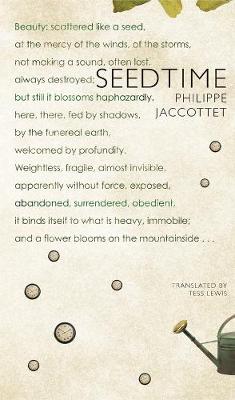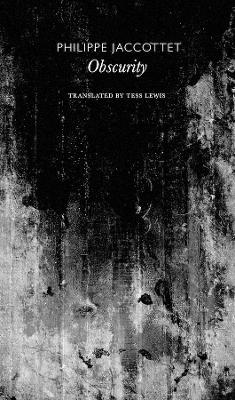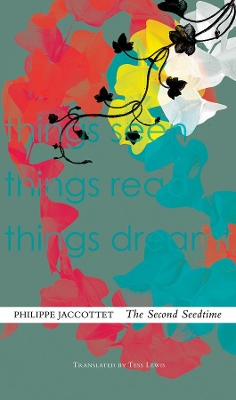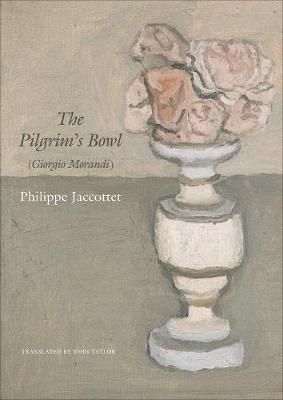SB - The Swiss List
4 total works
Since his first collection of poetry appeared in 1953, Philippe Jaccottet has sought to express the ineffable that lies at the heart of our material world in his essential, elemental poetry. As one of Switzerland's most prominent and prolific men of letters, Jaccottet has published more than a dozen books of poetry and criticism, but none are widely available in English. Seedtime - Jaccottet's notebooks - is an especially good introduction to this leading francophone Swiss author, containing the poet's observations of the natural world and his reflections on literature, art, music, and the human condition. In these explorations, he returns again and again to the fundamental, focusing his prodigious talents on describing the exact shade of light on a meadow, the sound of running water, the color of cherry and almond blossoms, or the cry of a bird in the stillness before dawn. In this translation by Tess Lewis, English readers will finally be able to join this poet as we follow in his footsteps of fifty years ago and find the still-viable seeds of his delicate and tenacious verse.
After several years abroad, a young man returns to his hometown to seek the man he calls master. This master, a brilliant philosopher, had made the young man into a disciple before sending him out into the world to put his teachings into practice. Returning three years later, the disciple finds his master has abandoned his wife and child and moved into a squalid one-room flat, cutting himself off completely from his former life. Disillusioned and reeling from the discovery, the young man spends an entire night listening to his master's bitter denunciation of the ideals they once shared. Obscurity, by noted thinker Philippe Jaccottet, is the story of this intense encounter between two men who were once very close and now must grapple with the fractured ideals that separate them. Written in 1960 during Jaccottet's period of poetic paralysis, the novel seeks to harmonize the best and worst of human nature-reconciling despair, falsehood, and lethargy of spirit with the need to remain open to beauty, truth, and the essential goodness of humankind.
Translated by Tess Lewis, Obscurity is Jaccottet's only work of fiction, one that will introduce new readers to the multifaceted skills of this major poet. Praise for the French edition "In its haggard sobriety, the account of this tormented soul's monologue is staggering ...a beautiful narrative, written in a resounding, solemn style."-La Table Ronde
Translated by Tess Lewis, Obscurity is Jaccottet's only work of fiction, one that will introduce new readers to the multifaceted skills of this major poet. Praise for the French edition "In its haggard sobriety, the account of this tormented soul's monologue is staggering ...a beautiful narrative, written in a resounding, solemn style."-La Table Ronde
Since his first collection of poetry appeared in 1953, Philippe Jaccottet has sought to express the ineffable that lies at the heart of our material world in his essential, elemental poetry. As one of Switzerland's most prominent and prolific men of letters, Jaccottet has published more than a dozen books of poetry and criticism. One of Europe's finest contemporary poets, Jaccottet is a writer of exacting attention. Through keen observations of the natural world, of art, literature, music, and reflections on the human condition, Jaccottet opens his readers' eyes to the transcendent in everyday life. The Second Seedtime is a collection of "things seen, things read, and things dreamed." The volume continues the project Jaccottet began three decades earlier in his first volume of notebooks, Seedtime. Here, again, he gathers flashes of beauty dispersed around him like seeds that may blossom into poems or moments of inspiration. He returns, insistently, to such literary touchstones as Dante, Montaigne, Gongora, Goethe, Kierkegaard, Holderlin, Michaux, Hopkins, Bronte, and Dickinson, as well as musical greats including Bach, Monteverdi, Purcell, and Schubert.
The Second Seedtime is the vivid chronicle of one man's passionate engagement with the life of the mind, the spirit, and the natural world.
The Second Seedtime is the vivid chronicle of one man's passionate engagement with the life of the mind, the spirit, and the natural world.
In The Pilgrim's Bowl, Swiss poet Philippe Jaccottet meditates on the work of Italian artist Giorgio Morandi and its power to evoke a complexity of emotions and astonishment. Jaccottet examines Morandi's ascetic still lifes, contrasting his artistic approach to the life philosophies of two authors whom he cherished, Pascal and Leopardi, and reflecting on the few autobiographical details we know about Morandi. In this small and erudite tome, Jaccottet draws us into the very heart of the artist's calm and strangely haunting oeuvre. In his literary criticism, Jaccottet is known for deeply engaging with the work of his fellow poets and tenaciously seeking the essence of their poetics. In this, his only book - length essay devoted to an artist, his critical prose likewise blends empathy, subtle discernment, and a determination to pinpoint, or at least glimpse, the elusive underlying qualities of Morandi's deceptively simple, dull-toned yet mysteriously luminous paintings. The Pilgrim's Bowl is a remarkably elucidating study based on a profound admiration for and a dialogue with Morandi's oeuvre.



